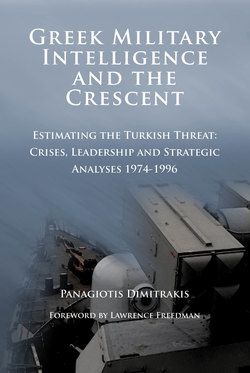Читать книгу Greek Military Intelligence and the Crescent - Dr. Panagiotis Dimitrakis - Страница 10
На сайте Литреса книга снята с продажи.
ОглавлениеChapter II Turkey: Greek Strategic-Intelligence Estimates
The 1974 Cyprus invasion was, in one sense, the Greek ‘Pearl Harbour’. Up to the last minute in July 1974, Greek military intelligence in Athens had not predicted any Turkish offensive. The warning provided by the KYP station in Cyprus was disregarded by KYP headquarters, thereby making any attempt to defend the island futile. This chapter begins with the testimony of a KYP officer in Cyprus during the days of the invasion and continues with military estimates of Turkish intentions in the 1980s and 1990s. The Greek intelligence assessment was that Turkey had a long-term expansionist strategy against Greece. Nonetheless, both Greek and Cypriot intelligence did not predict an invasion of the Cyprus Republic despite of the overwhelming capabilities the Turkish military had been sending to the occupied northern territory. A belief prevailed among Greek policy-makers and military strategists that Athens and Nicosia would not face a surprise attack by Ankara (on the pattern of the Yom Kippur War) given Turkey’s intention of joining the EU and achieving international recognition for the ‘Turkish Republic of Northern Cyprus’. However Turkey’s arms procurement after the end of the Cold War, her open propaganda, the daily Greek-Turkish dogfights over the Aegean and Ankara’s attempts to use the Muslim minority in Greek Thrace as a ‘political tool’ raised Greek concerns about Turkey’s true strategic intentions. In Thrace, covert Turkish actions were assessed as long-term, non-violent operations against Greek sovereign rights and security.
Until 1974, Greek intelligence data on both the Turkish order-of-battle and Turkey’s diplomatic intentions towards Greece was of poor quality. Despite the occasional crises and clashes between Turkish and Greek Cypriots in the 1960s, Greek intelligence operations were concentrated against Warsaw Pact Bulgaria and Yugoslavia, isolationist Albania, the USSR and domestic Greek communists. The surprise Turkish invasion of Cyprus in 1974 caused a change in the priorities of intelligence targets and analysis. The analytical mindset of the Greek Cold-War generals towards ‘the threat’ changed literally overnight after the Turkish offensive,106 while their staff officers prepared contingency plans for the island’s defence. According to a Vice-Marshal of the Air Force, interviewed by the author, the change in mindset and contingencies in the mid 1970s went as far as to issue the Tactical Air Command top-secret orders which amounted to authorising the launching of air strikes against Turkey without explicit prime-ministerial authorisation in times of imminent conflict. It was a rare case of pre-delegated authorisation that still remains highly classified.107
The first operational study of the Turkish armed forces’ performance in battle was completed in September 1974. This rare document gives us an insight into Greek perceptions of how the Turkish military employed personnel and war material in the operation in Cyprus. Analysing the Cyprus campaigns, Greek officers concluded that the Turkish military intended to divide the island using paratroopers in a bridgehead. During the operations of July and August 1974, Turkish infantry avoided urban warfare and made no attempt to seize villages and towns; those that posed some resistance, like Karava and Lapitho, were bypassed.108 Only after the stabilisation of the front did Turkish military gendarmerie and commandos undertake clearing missions. The invasion operations were judged to be ‘of good planning and slow materialisation’. The main factor that led to the Turkish victory was the massive numbers of troops and quantities of war material and not necessarily their value of war. Two infantry divisions, as well as two commando-paratrooper brigades, one armoured brigade and one gendarmerie brigade participated in the invasion.109
